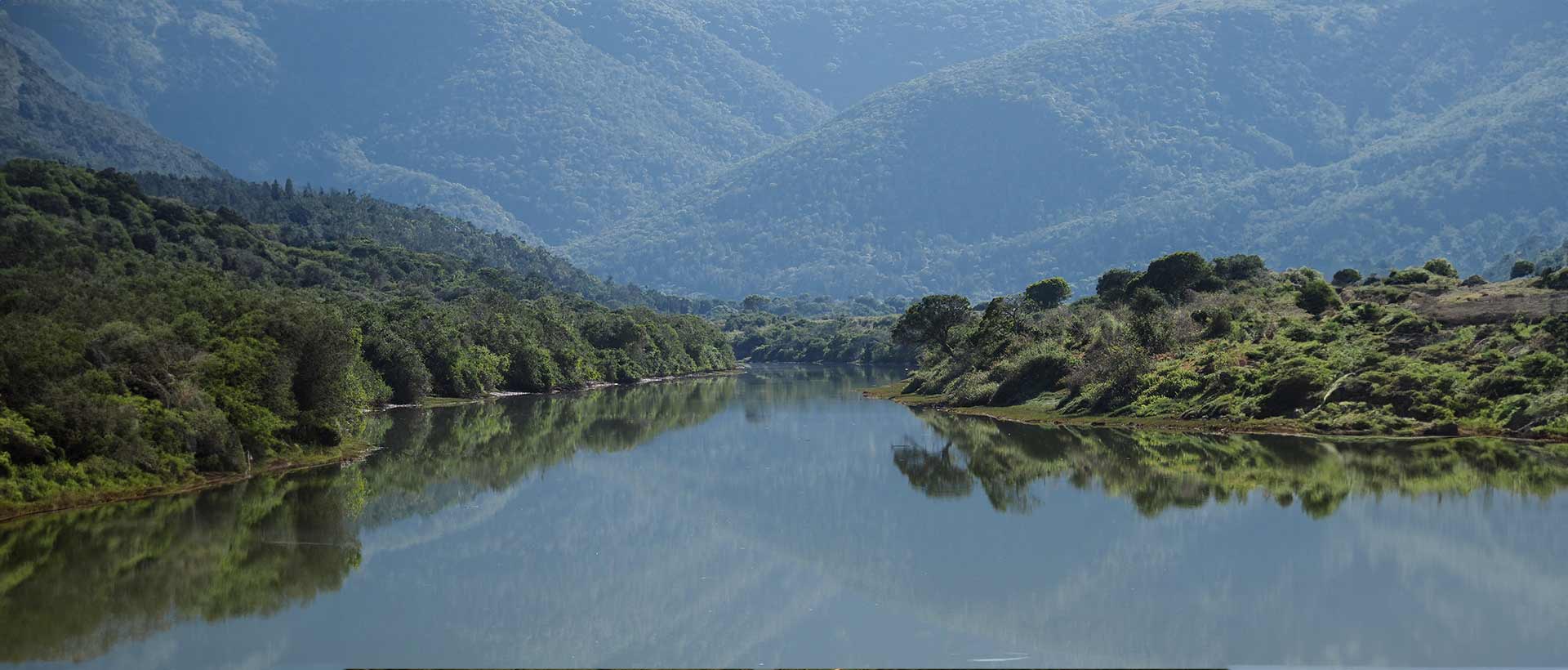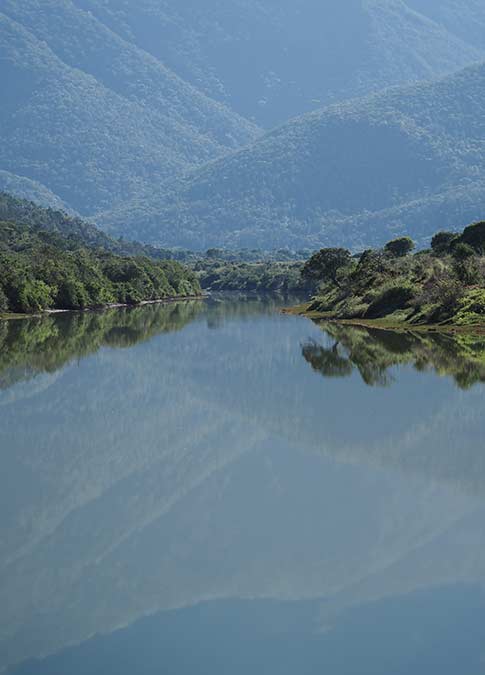Volunteer Update: Jan - June 2017
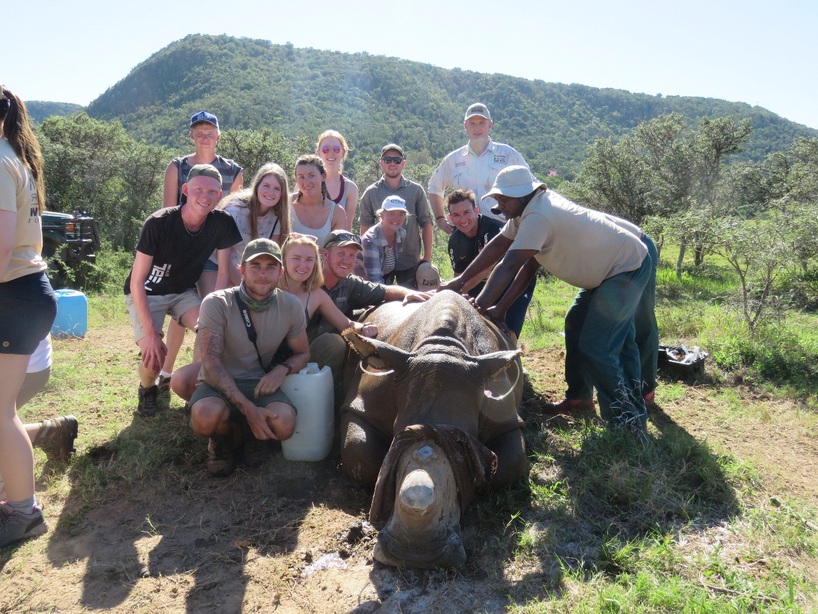
"One touch of nature makes the whole world kin" - William Shakespeare
This year has been filled with special experiences. Having enthusiastic and passionate volunteers, eager to learn has made for a very productive and successful year so far. Unforgettable moments and thrilling encounters have been part of daily life in the Kariega Volunteer Programme, as well as the forming of new friendships with like-minded individuals. Volunteer efforts have been focused on conservation and community work, making a difference both on and off the reserve.
Game Counts
The volunteers have helped with six game counts this year so far. After being prepared with a game count briefing, volunteers recorded data on male, female and juvenile numbers of the various species encountered as a specific route is driven through the reserve. Each game count takes approximately four hours to carry out. This is done in order to monitor wildlife numbers of large mammal and bird populations on the reserve and facilitates informed decisions on population management.
Birding & Birds in Reserves Project (BIRP)
It has been an excellent year of birding for the volunteers with many special sightings. Photos were captured where possible for the compilation of our Kariega Volunteers photographic bird identification kit, as well as the recording of species for assistance in the Birds in Reserves Project (BIRP) being conducted by the University of Cape Town. Some new sighting of this year so far include the red-fronted tinkerbird, green-backed cameroptera and the elusive narina trogon. Classic sightings and photos were taken of many other special birds too, such as the hamerkop, African harrier hawk, African spoonbills and purple rollers, among many others. The volunteers have collected 80 photographs of the species identified. Although there are many more, photographing such small, elusive, swift and often shy creatures isn’t easy! The volunteers have fared very well in this regard. Many have learnt to notice the smaller creatures and taken on birding as a new field of interest.
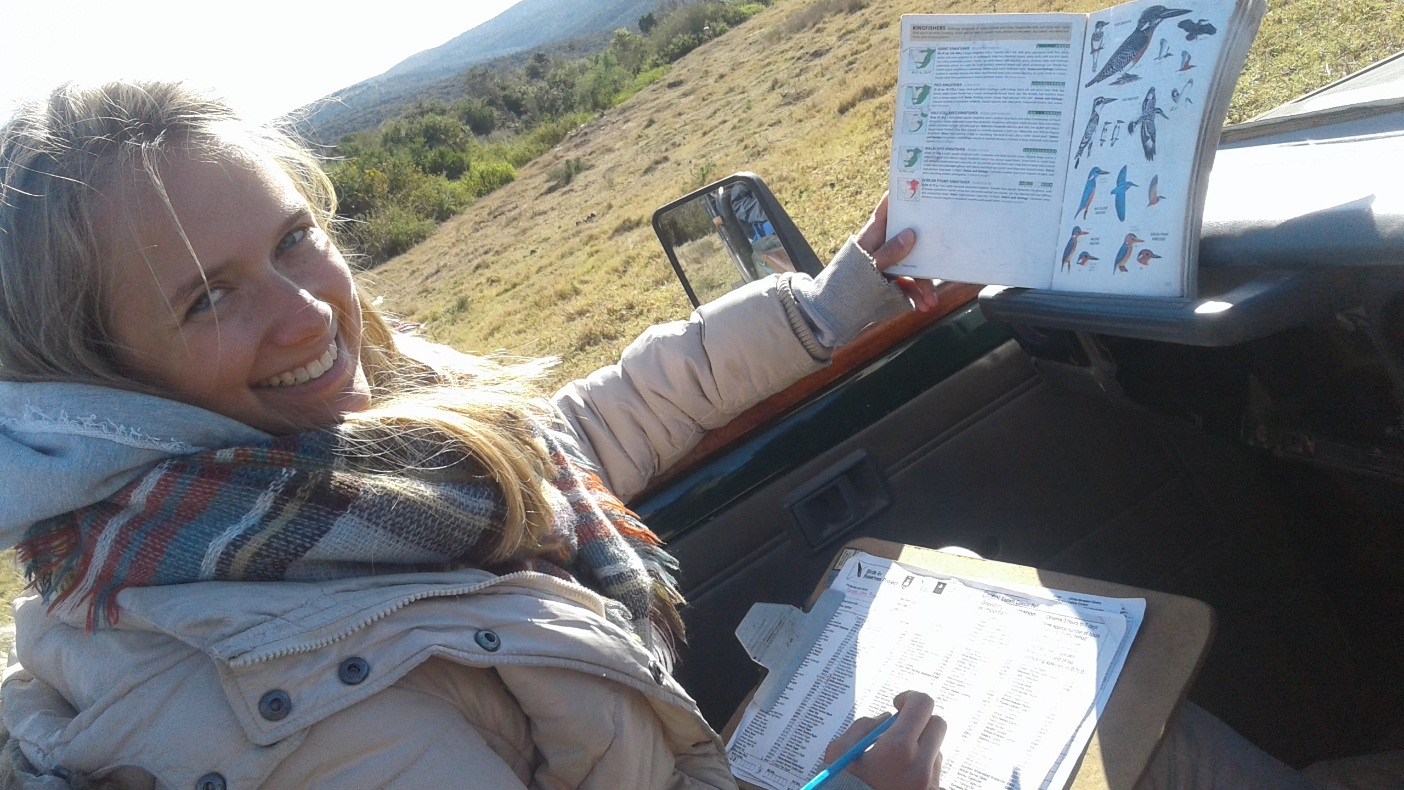
Rhino Monitoring
Rhino monitoring plays an important role to ensure these special animals remain happy and healthy on the reserve. It also assists in recording movement patterns which assist in anti-poaching. Volunteers have located and monitored these animals approximately twice a week and collected photos for individual identification. The year began with two heavily pregnant white rhinos spending their final weeks before delivery hidden away in the thicket preparing for birth. After three weeks, the new moms finally emerged with two brand new rhino calves. Thandi gave birth to her second calf, Colin, and rhino W2 gave birth to her second calf too. Sadly, two white rhinos died at Kariega this year. In May, two rhinos fell into the river when the bank collapsed. The male unfortunately drowned and although the female was rescued in time, she passed away about four weeks later.
The volunteers also assisted in locating and monitoring a young sub adult male white rhino who needed to be dehorned to reduce his appeal to poachers. More rhino procedures were to follow when a female adult had stepped into a coil of wire. The following day, the volunteers located and monitored this female until the vet could attend to her. These incidents allowed volunteers to experience hands on conservation as they physically handled these large animals, assisted with the application of drugs, temperature regulation and monitoring after the procedures. Assisting with these procedures has been truly phenomenal!
Elephant Monitoring
Elephant monitoring has been conducted one to two times a week this year with focus on determining diet, vegetation impact, movements and identifying individuals and genealogy. Although not every encounter makes this possible as these large animals sometimes move in the cover the thicket, the volunteers have done well in assisting in the identification of individuals.
Diet wise the elephants have shown a distinct preference for grass as this makes up nearly a quarter of their recorded diet, followed by sweet thorn, prickly pear and shrubs. The impacts on grasses has been most severe showing uprooting behaviour 67% of the time it is eaten. Prickly pear is utilized to the plants death 20% of the time. Both grasses and prickly pear are not hindered by thi and most grasses recover laterally quickly. Prickly pear spread easily through cladodes that are broken off and dropped during the feeding process.
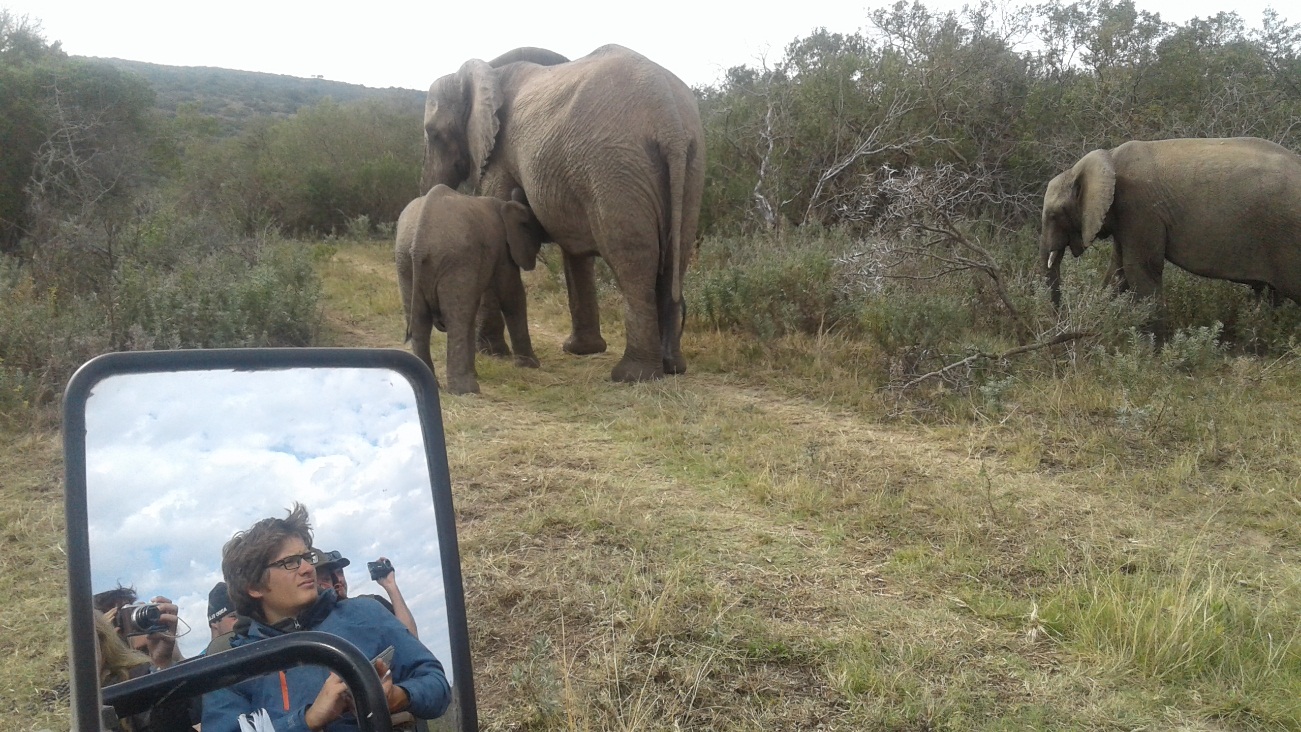
Lion Monitoring
The volunteers have continued monitoring and tracking lions using both tracks and signs, as well as telemetry, one to two times a week. This information is used to assess interactions so as to better understand the social behaviour of these big cats. Mating behaviour has been observed between lioness LS3 and two male lions on two occasions each between February and June. Monitoring lioness LS3 to determine pregnancy has not shown any significant indication as yet, but there is a chance Kariega may have new lion cubs in the near future!
This year the volunteers have assisted in two lion darting procedures. We helped to locate the animals, with the handling and procedures. This was necessary to change the tracking collars. This gave the volunteers an opportunity to get up close to these incredible cats being able to touch and examine them and assist the vets with injections.
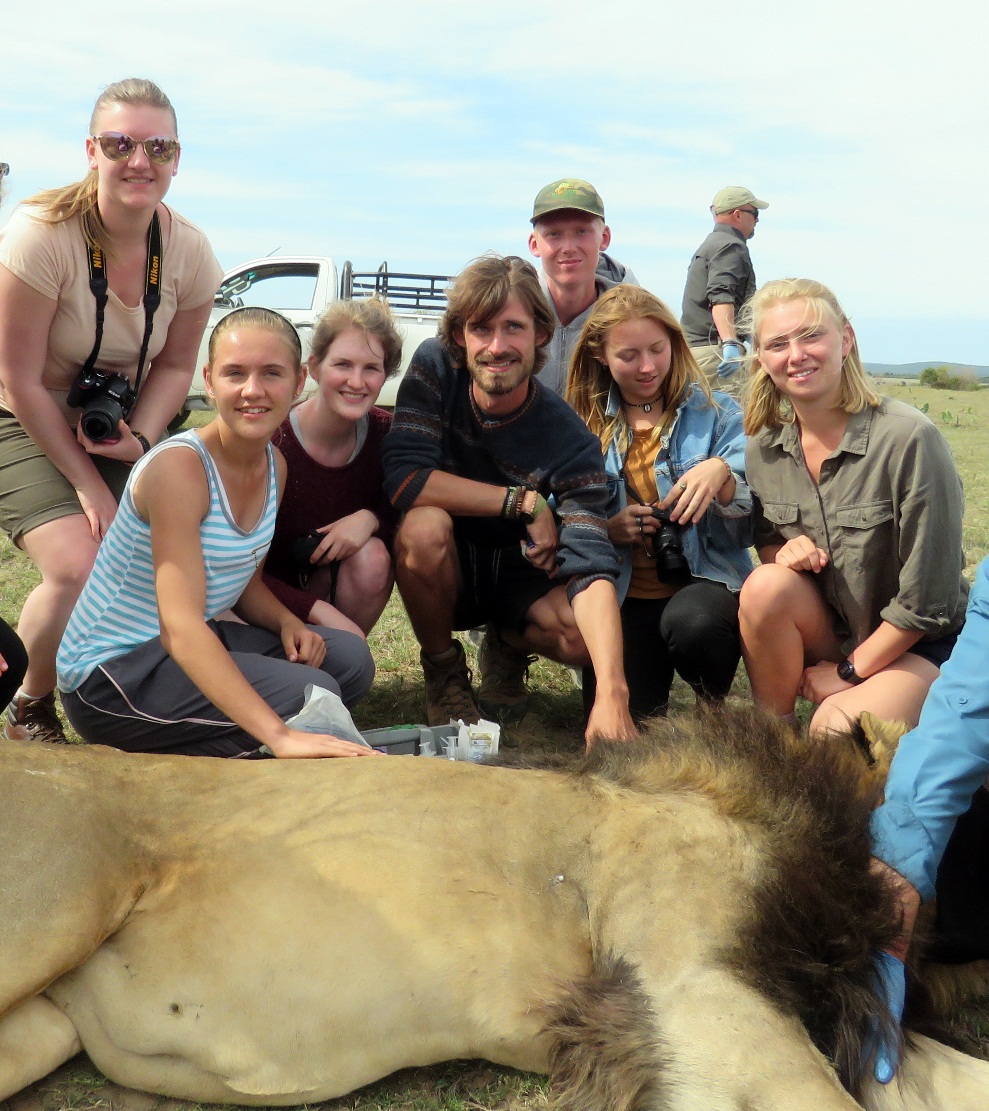
Serval Breeding Programme
In 2017 Kariega initiated a serval breeding programme. In January, the volunteers assisted with the construction of the breeding enclosures. The servals arrived in March, and the volunteers have been maintaining the hygiene in the enclosures. In order to maintain a good quality of life for these animals, we have been removing animal waste and carcass debris and been cleaning their water on a weekly basis. No mating behaviour has been monitored yet.
Camera Traps
We have used our three camera traps to focus on brown hyena monitoring this year. We aim to determine how many individuals there are on the reserve. We have focussed on areas where evidence, such as tracks, has been found. Setups have been conducted on animal paths and near waterholes. So far photographic evidence of one individual has been recorded and we have had sightings of what we believed to be another.
Alien Plant Eradication
We have tirelessly striven to maintain our high level of alien plant eradication this year, focusing primarily on black wattle. Most weeks the volunteers took on a densely populated landscape in the Nyathi valley which was covered with mature trees and seedlings alike. The volunteers decimated the alien population stands there, allowing indigenous vegetation an opportunity to recover and transforming the homogeneous alien landscape. Overall 15,585 black wattle plants were removed, with about 18% of those plants including mature seed producing trees.
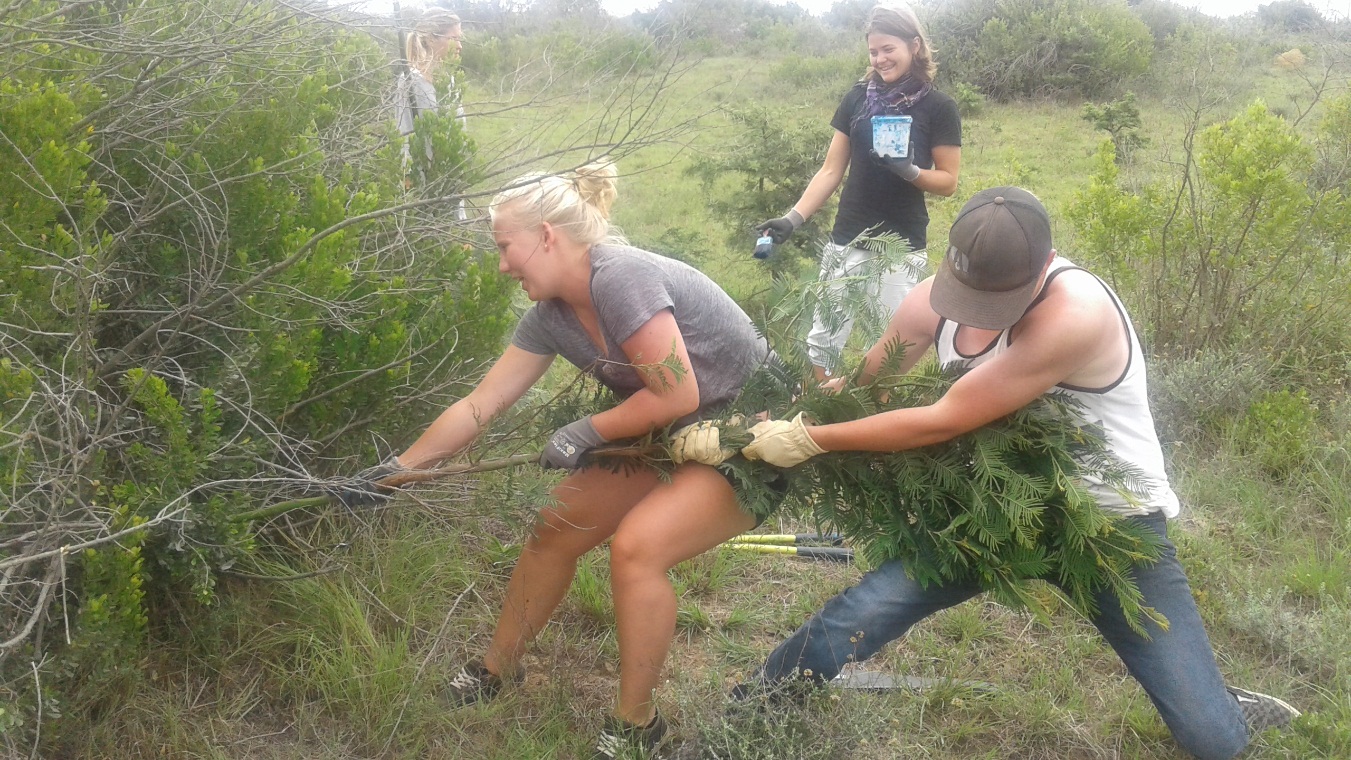
Nursery & Vegetation Projects
Porkbush (Portulacaria afra) has the ability to absorb a great deal of carbon from the atmosphere. This is the primary reason why the volunteers have endeavoured to spread the abundance of this plant on the reserve. Kariega has experienced a dry year to date, which has had a negative impact on the plants’ regrowth from off cuts. It has been clearly observed that plants that have been raised in the nursery, and then planted, have established much better. To date 1,550 plants have been replanted this year.
Road Maintenance
Road clearing and rock packing remain an important aspect of road maintenance on the reserve. The volunteers have targeted six damaged roads and repaired them with the careful placing of rocks. Road clearing has been conducted almost weekly to ensure the roadways remain accessible to game vehicles.
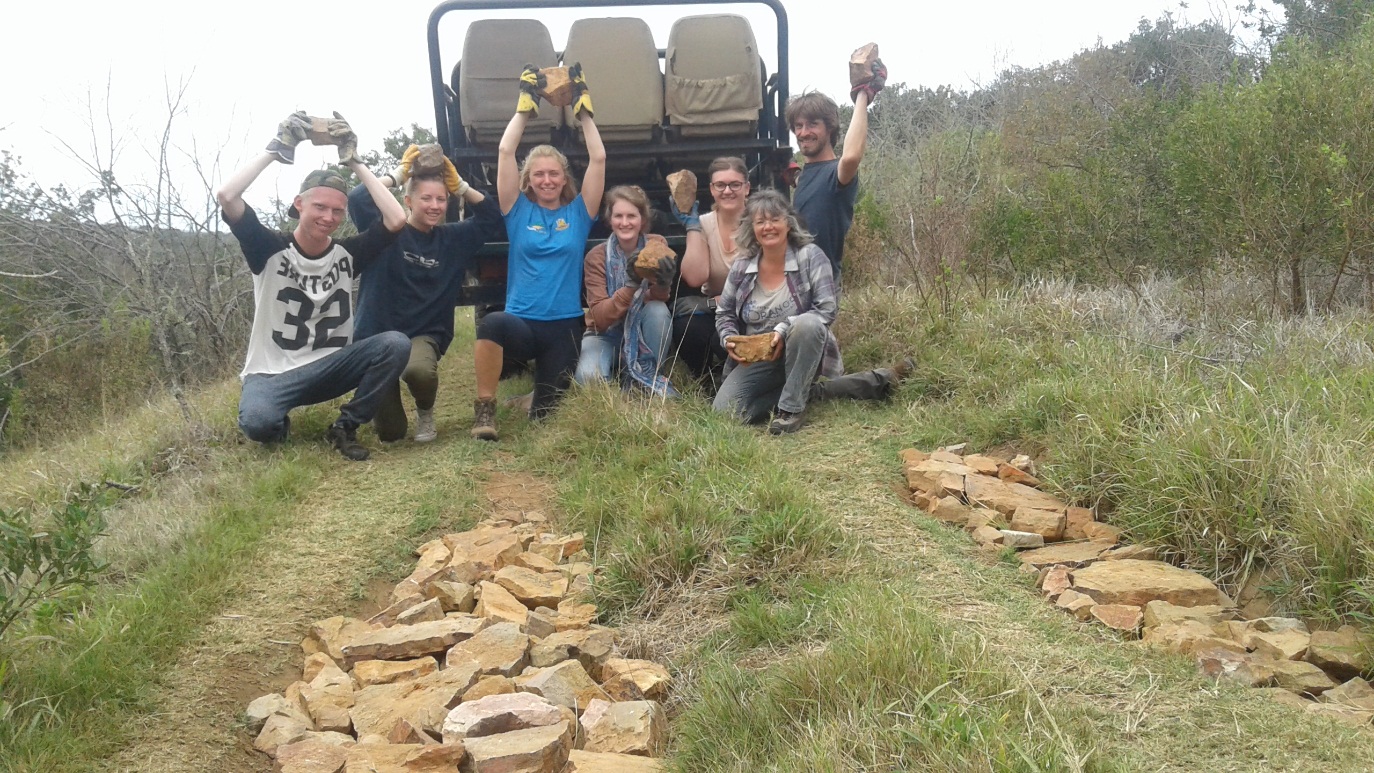
Community Outreach
Volunteers have donated roughly 35kg of school and personal supplies to the Helping Hands soup kitchen in Ekuphumleni and 10kg to Farmerfield school. The most rewarding gift remains the gift of time which has been given so compassionately by the volunteers.
The soup kitchen has been visited on a weekly basis and volunteers have shared with the children through teamwork games and education assistance as well as helping out in the kitchen with cooking, serving food and cleaning up. Volunteers have assisted in the classroom at Farmerfield school on a fortnightly basis. This has involved preparing and sharing lessons on life skills, geography, mathematics, environmental education and English. It’s a gift that keeps giving back. It is always very rewarding seeing how the children grow and are positively influenced by the volunteers. The encouragement and team building carried out by the volunteers has played a significant uplifting role for these children.
Fun Times
Hard work bears the fruit of special experiences on the reserve. Visiting scenic lookouts and landscapes on dawn drives to watch the sun rise and enjoying sundowners before the sunset have been thrilling! Picnics and swims at Paradise lagoon and the waterfall have been thoroughly gratifying experiences too. Boat cruises or canoeing down the Kariega river has given volunteers the opportunity to experience nature from a different perspective while having fun. Occasional bush lunches and dinners have also allowed volunteers to soak up the special African bush atmosphere first hand, with good company and a warm fire. Weekly night drives have also yielded many special moments like aardvark, hippos grazing and lions on the prowl. Not to mention stargazing where volunteers have been taught how to recognise constellations, planets and stars in the brilliant African night sky. Bush walks and tracking presentations have also taught volunteers to notice the signs of different species while enjoying the great outdoors on foot.
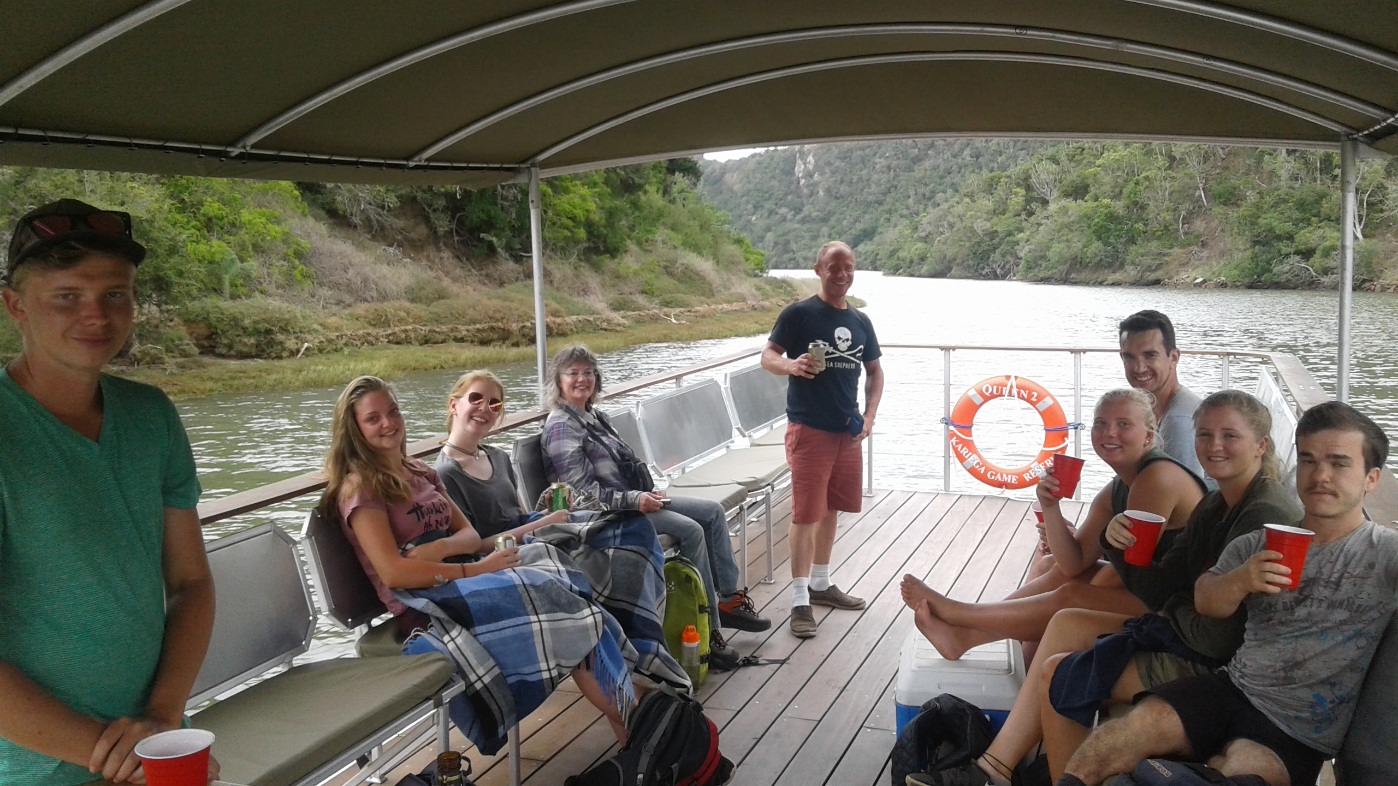
Thanks to all Kariega Conservation Volunteers
So far 2017 has been an incredible adventure and a very enriching and successful year for the Kariega Conservation Volunteer Programme. We are very grateful for all the volunteers who have helped and been part of the programme this year. You have all contributed to the great success we have attained. We look forward to everything that the second half of our year may hold. If the first half is anything to go by, we are in for a spectacular and unforgettable adventure!
Yours in conservation, Jarrett Joubert, Kariega Conservation Volunteer Co-ordinator.
